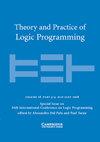as Input Language for Answer Set Solvers
IF 1.1
2区 数学
Q3 COMPUTER SCIENCE, SOFTWARE ENGINEERING
引用次数: 0
Abstract
Technological progress in Answer Set Programming (ASP) has been stimulated by the use of common standards, such as the ASP-Core-2 language. While ASP has its roots in nonmonotonic reasoning, efforts have also been made to reconcile ASP with classical first-order (FO) logic. This has resulted in the development of FO(·), an expressive extension of FO, which allows ASP-like problem solving in a purely classical setting. This language may be more accessible to domain experts already familiar with FO and may be easier to combine with other formalisms that are based on classical logic. It is supported by the IDP inference system, which has successfully competed in a number of ASP competitions. Here, however, technological progress has been hampered by the limited number of systems that are available for FO(·). In this paper, we aim to address this gap by means of a translation tool that transforms an FO(·) specification into ASP-Core-2, thereby allowing ASP-Core-2 solvers to be used as solvers for FO(·) as well. We present experimental results to show that the resulting combination of our translation with an off-the-shelf ASP solver is competitive with the IDP system as a way of solving problems formulated in FO(·).作为答案集求解器的输入语言
使用通用标准(如ASP- core -2语言)刺激了答案集编程(ASP)的技术进步。虽然ASP植根于非单调推理,但人们也在努力使ASP与经典的一阶逻辑(FO)相协调。这导致了FO(·)的发展,这是FO的一种表达性扩展,它允许在纯经典设置中解决类似asp的问题。对于已经熟悉FO的领域专家来说,这种语言可能更容易访问,并且可能更容易与基于经典逻辑的其他形式化结合起来。它由IDP推理系统支持,该系统已成功参加了多个ASP竞赛。然而,在这里,技术进步受到可用于FO(·)的系统数量有限的阻碍。在本文中,我们的目标是通过将FO(·)规范转换为ASP-Core-2的翻译工具来解决这一差距,从而允许ASP-Core-2求解器也被用作FO(·)的求解器。我们提出的实验结果表明,我们的翻译与现成的ASP求解器相结合,作为解决FO(·)中表述的问题的一种方式,与IDP系统相竞争。
本文章由计算机程序翻译,如有差异,请以英文原文为准。
求助全文
约1分钟内获得全文
求助全文
来源期刊

Theory and Practice of Logic Programming
工程技术-计算机:理论方法
CiteScore
4.50
自引率
21.40%
发文量
40
审稿时长
>12 weeks
期刊介绍:
Theory and Practice of Logic Programming emphasises both the theory and practice of logic programming. Logic programming applies to all areas of artificial intelligence and computer science and is fundamental to them. Among the topics covered are AI applications that use logic programming, logic programming methodologies, specification, analysis and verification of systems, inductive logic programming, multi-relational data mining, natural language processing, knowledge representation, non-monotonic reasoning, semantic web reasoning, databases, implementations and architectures and constraint logic programming.
 求助内容:
求助内容: 应助结果提醒方式:
应助结果提醒方式:


